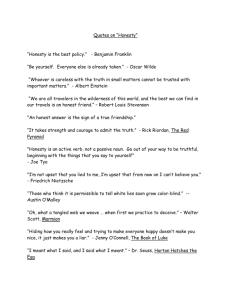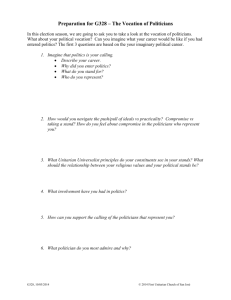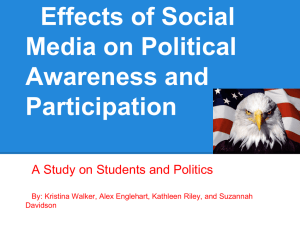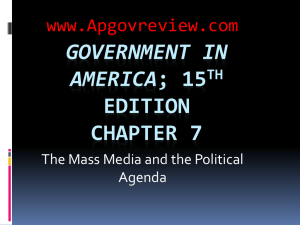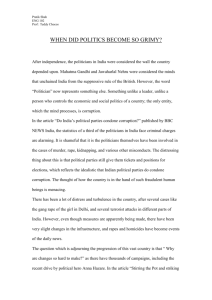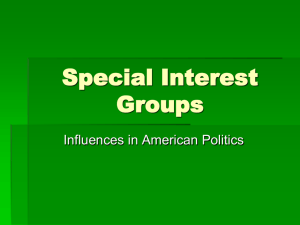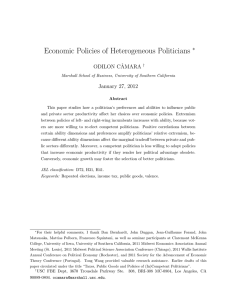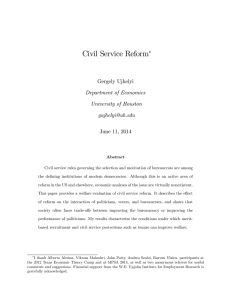Does Honesty Pay Off in Politics? Lisa McAlister, Department of
advertisement
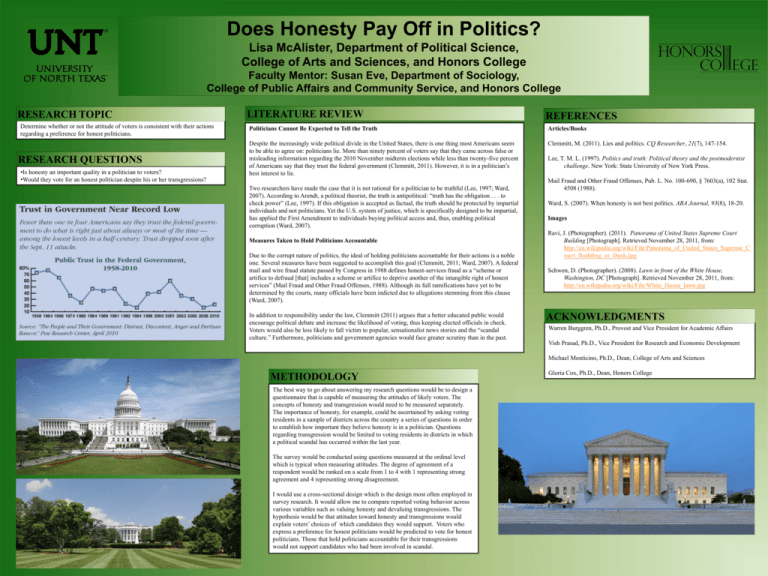
Does Honesty Pay Off in Politics? Lisa McAlister, Department of Political Science, College of Arts and Sciences, and Honors College Faculty Mentor: Susan Eve, Department of Sociology, College of Public Affairs and Community Service, and Honors College RESEARCH TOPIC Determine whether or not the attitude of voters is consistent with their actions regarding a preference for honest politicians. RESEARCH QUESTIONS •Is honesty an important quality in a politician to voters? •Would they vote for an honest politician despite his or her transgressions? LITERATURE REVIEW REFERENCES Politicians Cannot Be Expected to Tell the Truth Articles/Books Despite the increasingly wide political divide in the United States, there is one thing most Americans seem to be able to agree on: politicians lie. More than ninety percent of voters say that they came across false or misleading information regarding the 2010 November midterm elections while less than twenty-five percent of Americans say that they trust the federal government (Clemmitt, 2011). However, it is in a politician’s best interest to lie. Clemmitt, M. (2011). Lies and politics. CQ Researcher, 21(7), 147-154. Two researchers have made the case that it is not rational for a politician to be truthful (Lee, 1997; Ward, 2007). According to Arendt, a political theorist, the truth is antipolitical: “truth has the obligation . . . to check power” (Lee, 1997). If this obligation is accepted as factual, the truth should be protected by impartial individuals and not politicians. Yet the U.S. system of justice, which is specifically designed to be impartial, has applied the First Amendment to individuals buying political access and, thus, enabling political corruption (Ward, 2007). Measures Taken to Hold Politicians Accountable Due to the corrupt nature of politics, the ideal of holding politicians accountable for their actions is a noble one. Several measures have been suggested to accomplish this goal (Clemmitt, 2011; Ward, 2007). A federal mail and wire fraud statute passed by Congress in 1988 defines honest-services fraud as a “scheme or artifice to defraud [that] includes a scheme or artifice to deprive another of the intangible right of honest services” (Mail Fraud and Other Fraud Offenses, 1988). Although its full ramifications have yet to be determined by the courts, many officials have been indicted due to allegations stemming from this clause (Ward, 2007). In addition to responsibility under the law, Clemmitt (2011) argues that a better educated public would encourage political debate and increase the likelihood of voting, thus keeping elected officials in check. Voters would also be less likely to fall victim to popular, sensationalist news stories and the “scandal culture.” Furthermore, politicians and government agencies would face greater scrutiny than in the past. Lee, T. M. L. (1997). Politics and truth: Political theory and the postmodernist challenge. New York: State University of New York Press. Mail Fraud and Other Fraud Offenses, Pub. L. No. 100-690, § 7603(a), 102 Stat. 4508 (1988). Ward, S. (2007). When honesty is not best politics. ABA Journal, 93(8), 18-20. Images Ravi, J. (Photographer). (2011). Panorama of United States Supreme Court Building [Photograph]. Retrieved November 28, 2011, from: http://en.wikipedia.org/wiki/File:Panorama_of_United_States_Supreme_C ourt_Building_at_Dusk.jpg Schwen, D. (Photographer). (2008). Lawn in front of the White House, Washington, DC [Photograph]. Retrieved November 28, 2011, from: http://en.wikipedia.org/wiki/File:White_House_lawn.jpg ACKNOWLEDGMENTS Warren Burggren, Ph.D., Provost and Vice President for Academic Affairs Vish Prasad, Ph.D., Vice President for Research and Economic Development Michael Monticino, Ph.D., Dean, College of Arts and Sciences METHODOLOGY The best way to go about answering my research questions would be to design a questionnaire that is capable of measuring the attitudes of likely voters. The concepts of honesty and transgression would need to be measured separately. The importance of honesty, for example, could be ascertained by asking voting residents in a sample of districts across the country a series of questions in order to establish how important they believe honesty is in a politician. Questions regarding transgression would be limited to voting residents in districts in which a political scandal has occurred within the last year. The survey would be conducted using questions measured at the ordinal level which is typical when measuring attitudes. The degree of agreement of a respondent would be ranked on a scale from 1 to 4 with 1 representing strong agreement and 4 representing strong disagreement. I would use a cross-sectional design which is the design most often employed in survey research. It would allow me to compare reported voting behavior across various variables such as valuing honesty and devaluing transgressions. The hypothesis would be that attitudes toward honesty and transgressions would explain voters’ choices of which candidates they would support. Voters who express a preference for honest politicians would be predicted to vote for honest politicians. Those that hold politicians accountable for their transgressions would not support candidates who had been involved in scandal. Gloria Cox, Ph.D., Dean, Honors College
